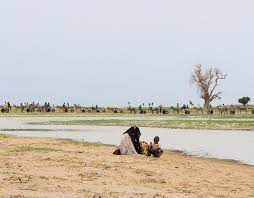How livelihood
Losses Create an enabling environment for Fragility in the Lake Chad region
Conflict
in the Lake Chad region is a function of the using and controlling resources
for livelihood. The loss of livelihood is a powerful weapon against peace and security
in a society like mine. I don’t want to believe that there is no correlation
between climate change and conflict when it is already an everyday reality in
Africa. Climate change provides an enabling environment that exacerbates
conflict and one of such indicators is the loss of livelihood. One of the
several classical examples is the Lake Chad region where there is a rise in
insurrectionism within and in the borders. Since we are an agrarian society,
then our natural resources become indispensable in sustaining our livelihood.
Hence, the use of water, land and vegetative cover is dependent on farmers,
fishermen and herdsmen. This creates a potential ground for conflict when
competition arises. When the demand for these resources by the users is more
than the supply and yet, there are no alternatives of using them. It leads to
scarcity of the resources (such as land and water) and eventually conflict of
who to control and use the resources. Ultimately results in unhealthy
competition among the users. Displacement becomes inevitable – thereby
making the entire population (especially the young) vulnerable to join armed
groups in the search for alternatives. These are loopholes that violent
extremists seize to gain more boundaries even beyond the scale of the Lake Chad
region.
Conflict
on resource control
The
loss of livelihood is a risk multiplier that paves ways for a less peaceful
world. Because everyone wants to control this limited resource as a “share
holder”, protecting boundaries come into place – this leads to an outbreak of
(armed) conflict. This is now between the governed and the ungoverned. These
ungoverned areas are the tactics that armed groups use to win members of the
community. Studies have shown that individuals are more likely to engage in
violence, be displaced, migrate or join armed groups, including violent
extremist organizations such as Boko Haram, if they feel marginalized and
treated unfairly, and if they don’t have access to basic services, rather than
because of a warming climate. Giving food on the table of those affected by the
shrinking Lake Chad is just a first aid approach but strengthening livelihood
options becomes a long term and sustainable approach. There are several factors
that interact with conflict; it doesn’t just happen just like that. The
conflict of control of resources could result in ethnic and religious war –
social disorderliness since the users of these resources have an identified
culture and religion.
Countries
with high environmental impacts have high tendencies of joining armed groups.
The United Nations Environment Programme (UNEP) has found that over the last 60
years, at least 40 percent of all internal conflicts have been linked to the
exploitation of natural resources, whether high-value resources. Conflicts
involving natural resources have also been found to be twice as likely to
relapse because there can be no durable peace if the natural resources that
sustain livelihoods and ecosystems are destroyed. Peace is not just the absence
of war; it is also the ability to sustain one’s livelihood. The shrinking Lake
Chad has been a breeding ground of armed groups in terms of reducing the
community capacity to cope through the displacement of people from their
livelihood. This displacement could permanently erode people’s livelihood
options because in some cases people have multiple livelihood options when such
options have been exhausted, then they become left with nothing – it is the
vulnerability state of an individual.
While
responding to a report released by UNODC on “climate change could mean more terrorism
in the future” the Nigerian President said; “the oasis in the desert is just a
desert now, farmers and herdsmen struggle over the little water left; herdsmen
migrate in search of greener pasture resulting in conflicts; our youths are
joining terrorists group because of lack of job and difficult economic
conditions.” The ability to fight our violent extremists is not a determinant
of arms and weaponry but how to strengthen the people’s belief towards the
government meeting the needs of their society without any externalities
involved. This is why resolutions like that on climate change as a threat to
global peace, security and stability that were turned down at the United
Nations Security Council through a veto power should be reviewed because the
reality of the climate crisis in Africa is different from the rest of the
world. This is to further emphasize that if Africa is not safe, Europe is not
safe. Hence nowhere is safe until everywhere is safe.
Oladosu
Adenike (oladosuadenike32@gmail.com) is an ecofeminist,
ecoreporter and the founder of I Lead Climate Action Initiative that advocates
for the restoration of Lake Chad and a green democracy.







0 Comments
We are open to listening to your comment.